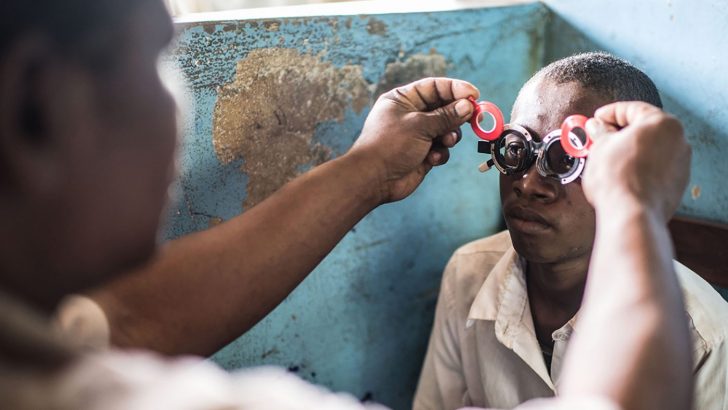People living with a disability need to be at the heart of development, Catrina Sheridan tells Michael Kelly
Sightsavers is an organisation on a mission. When we meet, the recently-appointed CEO of Sightsavers Ireland Catrina Sheridan is brimming with enthusiasm about plans for the year ahead.
At heart, the work of Sightsavers is quite simple: to work with those people in the developing world who are needlessly and avoidably blind and give them the gift of sight. And Catrina is very frank about where Sightsavers fits in to that equation: “We rely on the people of Ireland, people are great with their support, but without that support, we can’t do out vital work,” she insists.
It’s no secret that parts of the charity sector have suffered a loss in public confidence due to a small number of scandals in a couple of charities. Sightsavers takes public trust and confidence very seriously. In this context, Catrina tells me that Sightsavers Ireland is proud to have been shortlisted for the Good Governance Awards.
Launched by The Carmichael Centre, supported by the Charities Regulator, Volunteer Ireland, ICTR and Davy, the Good Governance Awards are designed to facilitate the promotion and recognition of good governance practice and help to increase much-needed public trust in the sector.
“One of the things we’re proudest of is the value for money and the effectiveness of what we can do with donations,” Catrina says. “What donors may perceive as little money, goes so far in the developing countries we work in”.
But, Sightsavers is not just looking at the treatment of diseases, but also the ultimate elimination of these diseases. To this end, Sightsavers is a leader in an ambitious Global Trachoma Mapping Project (GTMP). Trachoma, which is responsible for 3% of the world’s blindness, is caused by the bacterium Chlamydia trachomatis and is spread through personal contact and by flies that have been in contact with discharge from the eyes or nose of an infected person.
After repeated infection it can develop into trichiasis – where the eyelids turn in and the lashes scrape the eyeball, causing great pain and scarring, eventually leading to permanent blindness.
“Over 200 million people are at risk of suffering from trachoma. What has been interesting about the mapping project, has been the collaboration between different agencies and organisations.
“Trachoma is an inequality issue. It used to exist in the tenements in Dublin up until 60 years ago, so it is a real ‘poverty disease’. But, it’s so preventable, that’s why the target has been set to eliminate the disease by 2020,” Catrina says.
The mapping project was carried out using smartphones to see where exactly the issue lay. The result is, different countries now have a timeline on eradication and different funders came forward to put the resources behind it. “It’s a great example of partnership,” Catrina believes.
Highlighting and tackling global inequality is also a key pillar in Sightsavers’ policy objectives. “For too long the voices of people with disabilities have been ignored in the fight against global poverty. So, we’re working hard to ensure that people living with a disability are put at the centre of the development agenda to ensure that their specific needs are met and their voices heard,” according to Catrina.
Advocacy is a newish aspect of the work of Sightsavers Ireland, but it’s an area that Catrina and her colleagues are embracing with gusto to ensure that disability is always a consideration in targeting development.
“Living with a disability in the developing world can almost be a ‘double whammy’,” Catrina says. “Not only are they poor and living in an unequal society, they are often marginalised because of their disability as well”.
Stigma continues to be an enormous issue, where people feel a sense of shame around disability. “Part of that stigma is coming from a lack of awareness and education on the subject of disability and inclusion,” she believes. So, one of Sightsavers’ priorities is about raising awareness not just of disability, per se, but also the fact that disability is something that can potentially affect anyone.
While Sightsavers will continue to prioritise pragmatic interventions like eye operations, increased activity around advocacy is in a sense going back to basics. When Sir John Wilson first founded the organisation in 1950, it was about ensuring that people with blindness lived as fulfilling lives as possible. “So, in a sense, we’re continuing that, and trying to expand it,” Catrina says.
“If I had to sum it all up, it’s about ensuring that we, as a development community, see everything through the lens of disability.”
The challenge is great, But Catrina comes across as someone who in undaunted. “It’s an audacious goal, but it’s one I’m confident, working together, we can achieve.”
“The support we receive from the Irish public and from readers of The Irish Catholic in particular, makes it possible for us to transform the lives of people in developing countries.”


 Michael Kelly
Michael Kelly 16-year-old Mohammed from Zanzibar is measured for spectacles.
16-year-old Mohammed from Zanzibar is measured for spectacles. 